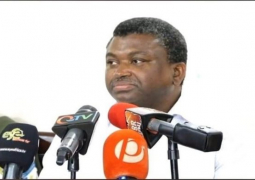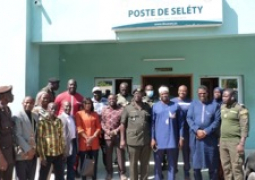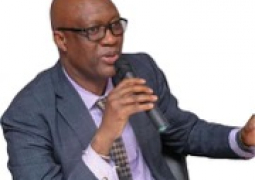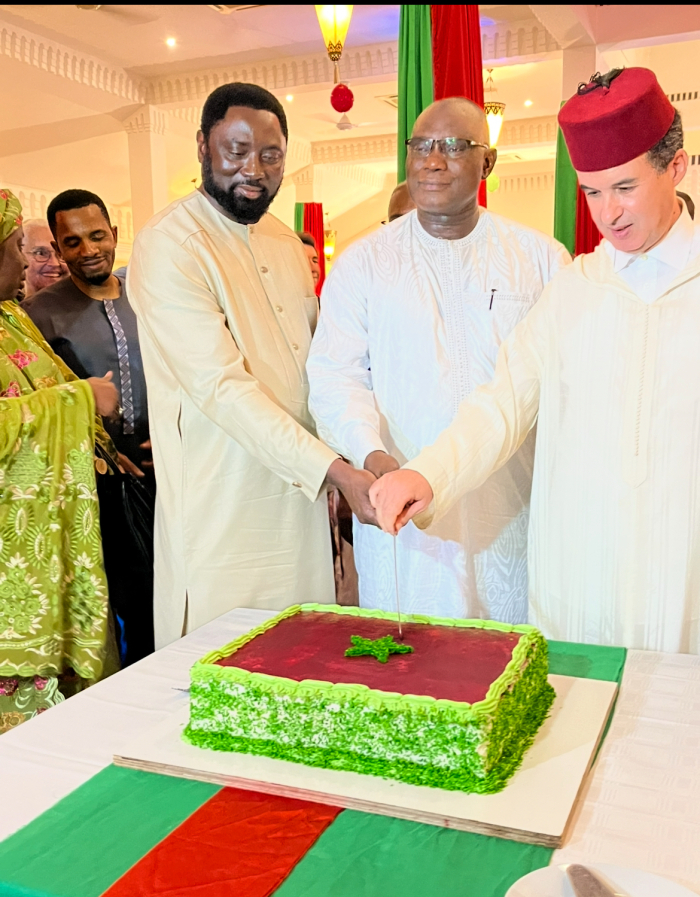
The high-profile diplomatic event brought together a distinguished gathering of government officials, members of the diplomatic corps, representatives of international and regional organisations, religious leaders, business leaders, and friends of Morocco to celebrate what was described as a “momentous milestone” in the Kingdom’s modern history.
Among the dignitaries present were the Hon. Speaker of the National Assembly Mr Fabakary Tombong Jatta, Minister for Foreign Affairs, International Cooperation and Gambians Abroad, Mr Sering Modou Njie, outgoing Foreign Minister and now AU envoy, Dr Mamadou Tangara, Cabinet Ministers, Ambassadors, heads of international organisations, and prominent members of Gambian society.
In his official statement, Mr Ahmed Belhadj, Chargé d’Affaires of the Kingdom of Morocco in The Gambia, expressed deep gratitude for the presence of distinguished guests and friends of Morocco, noting that their participation symbolised the strong and enduring friendship between The Gambia and the Kingdom.
“It is with profound distinction that we convene in The Gambia to mark this joyous occasion the 26th anniversary of the accession of His Majesty King Mohammed VI to the Throne,” Mr Belhadj said. “This celebration is not only symbolic of the love and loyalty between the King and the Moroccan people, but it also reflects the Kingdom’s extraordinary journey of transformation, unity, and ambition over the past two and a half decades.”
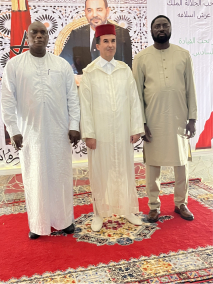
He emphasised that under the enlightened and forward-looking leadership of King Mohammed VI, Morocco has made remarkable strides in economic development, political stability, social reform, and international diplomacy.
“Morocco has built an advanced, inclusive, and solidarity-based nation that prioritises human development, universal access to social protection, and sustainable economic growth,” the diplomat stated.
Key among Morocco’s achievements are landmark policy initiatives including the Green Morocco Plan, the Industrial Acceleration Strategy, renewable energy transitions, and the digital transformation agenda. These reforms, he noted, have positioned Morocco as a regional leader and a hub for innovation and trade.
Mr Belhadj highlighted major infrastructure successes such as the Tangier Med Port complex - one of the largest in Africa and a vital node in global shipping, and the high-speed rail line linking Tangier to Rabat and Casablanca, with ongoing expansion towards Marrakesh and the upcoming Dakhla Atlantic Port project, expected to be completed by 2028.
“Morocco’s infrastructural revolution is not just about mobility; it is about national pride, job creation, regional connectivity, and long-term economic competitiveness,” he said.
On the international front, the Chargé d’Affaires praised King Mohammed VI’s foreign policy, especially the Kingdom’s strategic role in Africa’s socioeconomic development. Through South-South cooperation, Morocco has consistently invested in human capital across the continent, with over 25,000 African students studying in Moroccan universities and thousands benefiting from vocational training annually.
The Morocco-Nigeria Gas Pipeline, a flagship project, is set to benefit 13 African countries including The Gambia, enhancing energy access and regional integration. Additionally, the King’s Atlantic Initiative aims to open up Sahel countries to Atlantic trade and cooperation, further demonstrating Morocco’s leadership in continental development.
Morocco has also taken centre stage in international sports diplomacy, with its co-hosting of the 2030 FIFA World Cup with Spain and Portugal, and the upcoming 2025 Africa Cup of Nations (AFCON). These events are expected to catalyse massive investments in infrastructure, tourism, and job creation.
“Billions of euros will be invested by 2030, creating thousands of jobs and strengthening Morocco’s economy. But beyond sport, this is a national project of unity, pride, and development,” Mr Belhadj noted.
Turning to bilateral relations, Mr Belhadj commended the strength of the ties between Morocco and The Gambia, describing it as “fraternal, strategic, and growing.” He noted that the past two years have seen a deepening of diplomatic engagement, culminating in the 3rd Joint Cooperation Commission in Dakhla, which yielded 11 new agreements, bringing the total to 36 cooperation agreements.
He also announced that a Morocco-Gambia Business Forum is in the pipeline to further explore trade and investment opportunities between the two nations.
“We express profound appreciation to the Government of The Gambia for its unwavering friendship and collaboration,” he said. “We are confident that continued joint efforts will take our partnership to new heights.”
Mr Belhadj took the opportunity to congratulate Hon. Sering Modou Njie on his recent appointment as Minister for Foreign Affairs and wished him success in advancing Gambia’s foreign relations. He also paid tribute to Dr Mamadou Tangara, who was recently appointed as AU Special Representative for Mali and the Sahel, thanking him for his crucial role in strengthening Morocco-Gambia ties.
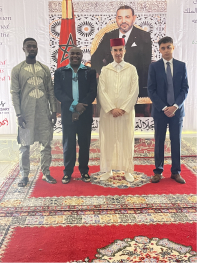
In his response, Foreign Minister Sering Modou Njie delivered a warm message on behalf of President Adama Barrow, the Government and the people of The Gambia.
“It is with immense honour and deep appreciation that I join you to celebrate the 26th Anniversary of His Majesty King Mohammed VI’s accession to the Throne,” Minister Njie stated. “This celebration is not only a reflection of the King’s achievements but also a testimony to Morocco’s enduring legacy of peace, progress, and partnership in Africa.”
Minister Njie applauded Morocco’s role in promoting South-South cooperation, climate diplomacy, peace, and stability on the continent, calling His Majesty’s Royal Initiative for Africa a “shining example of visionary leadership.”
“The Gambia has been a proud beneficiary of Morocco’s generosity from education and agriculture to health and institutional capacity building. These efforts have left a tangible mark on our development,” he stated.
The Minister reaffirmed Gambia’s commitment to deepening ties with Morocco in areas of trade, investment, tourism, and people-to-people exchange, highlighting the political will at the highest level in both countries to strengthen bilateral cooperation.
“As we mark this significant anniversary, let us renew our shared commitment to a united, peaceful, and prosperous Africa,” the Foreign minister concluded.
The night ended with a celebration of Moroccan culture and hospitality, with guests enjoying traditional cuisine, music and warm exchanges that reflected the enduring brotherhood between the two nations.
“Long live the Kingdom of Morocco! Long live the Republic of The Gambia! Long live the Morocco-Gambia brotherhood!” echoed Mr Belhadj to a round of applause.



